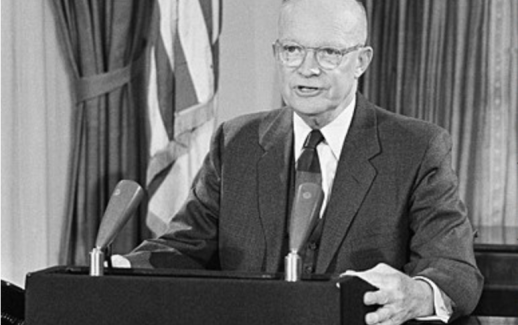The Big One is coming and the “U.S. military is not ready” says a story and narrative distributed with verbatim titling among many above-pictured, commonly aligned partisan news outlets. These sources morphed warnings from STRATCOM’s Navy Admiral Charles A. Richard’s deadly serious warnings that the U.S. ability to deter China is slowly eroding into the message that the U.S. military is not ready for a war if China attacks Taiwan. The latter non-readiness message could encourage China to attack sooner, whereas Admiral Richard’s real message would shore up that deterrence.
It seems that few, and none better than Tyler Rogoway’s and Oliver Parken’s work at The Drive reported professionally on this timely, essential message from Admiral Richard.
Admiral Richard did not say the U.S. military was not ready, but that it was losing ground in deterring war that would likely be protracted and would test the U.S. as it has not been in a long time. Admiral Richard’s actual comments assumed the U.S. could, with rapid action that cuts through the bureaucracy, reverse the erosion of deterrence and shore-up that metaphorically ‘slowly sinking ship’ of military deterrence.
The partisan outlets share some ill-political motivation implied in their midterm election timing by misrepresenting Admiral Richard’s remarks in their headlines and leads, and some in the body of their opinions to pave the way for a Trump candidacy in 2024.
Except that the U.S. Military was subject to 4 years of Trump from 2016-2021. It is now 2022: do we expect the impact of those 4 years has not influenced the current state of deterrence and readiness? If the military wasn’t readier after 4 years of Trump before whom there was bipartisan recognition of China’s military buildup, why not? One reason could be that Trump got rid of an effective Secretary of Defense, James Mattis, who was already moving briskly on boosting military readiness, adapting to China’s rise, and proved he was realistic about Russia.
In fact, SecDef Mattis, in his National Defense Strategy preamble directly forecast what Admiral Richard now warns us of:
“Some competitors and adversaries look to optimize their targeting of our battle networks and operational concepts, while also using other areas of competition short of open warfare to achieve their ends…These trends if unaddressed, will challenge our ability to deter aggression.” (cited by Benjamin Nguyen, p. 17, at the link).
Despite SecDef Mattis’ priorities and non-stop energy and work ethic, he was constructively fired by passive-aggressive, undermining tweets from Trump in 2018 just weeks after SecDef Mattis approved a crippling defensive strike on Yevgeny Prigozhin’s Wagner Group unit leading Syrian regime-proxies into battle against Kurdish positions in Syria containing allied U.S. troops.
So more Trump leadership will make the U.S. military more ready? Where is Trump’s impetus to do so? He clearly claimed NATO was obsolete, America was what Putin serially accused it of being in the world, and should isolate itself at home letting the world and its many resources fall under Eastern dictators’ influence while confirming their influence narratives with policies that reinforce them in the minds of emerging nation leaders. Lockstep in speaking angry narratives about the United States as shared with Putin do not convince me that Trump was in good faith with his big talk about being pro-military.
When you see headlines and partisan studies such as that put out by the Heritage Foundation about the military being unready, can we ask why the Heritage Foundation did not come out during Trump’s 4 years in office and declare the U.S. military unready for China after years of predictions that rivalry with China and China’s military buildup required it. What was Trump doing if not tweeting the United States into deeper division?
An added negative effect of this attempt to obtain one’s preferred party in the White House despite poor results getting the military ready? It enables Trump loyalists who threaten betrayal of a third key ally, Ukraine, to drive a repeat of the humiliating, agitating withdrawal from Afghanistan with a low quality plan, low quality exit strategy, and low quality result.
Shall we tolerate a partisan set of agitators in Congress and the fearful, hand-wringing media abusing the First Amendment freedom of the press to throw itself into unprofessional partisan political servitude that helps autocratic rivals?
We need a free press corps that adopts the Dragnet approach and reports “just the facts Ma’am,” and those, in greater factual context.
SecDef Mattis saw the very real need for rebuilding U.S. alliances. President Joe Biden’s team, post-Afghanistan, has built and supported U.S. alliances while forming AUKUS, a new one, which in time should add Japan and South Korea. And President Biden’s team has overseen the inclusion of strong future members in NATO, Finland and Sweden.
While the Biden Administration has suffered much bad P.R. and no small amount of agitation propaganda and disinformation attacks on it, it has actually been doing a fairly good job on Ukraine and in rebuilding U.S. alliances that will be much needed as the autocratic chieftains rise on the flanks of the free world, aiming to snuff it out.
The one thing the Biden Administration must immediately achieve diplomatically at home is to win over the U.S. oil patch to curb inflation and reduce dependence on Saudi Arabia and OPEC Plus: cut a deal with Big Oil on the coming energy transition, giving them a bigger role in that transition, and hammer out the details.

